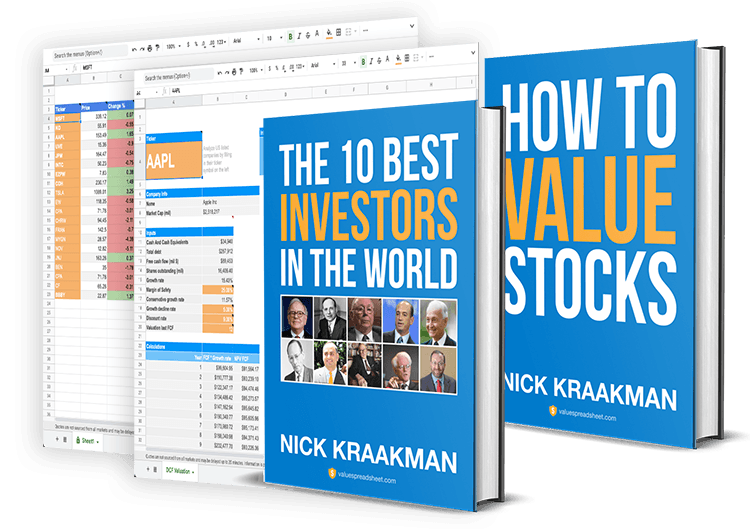Transcript
Welcome back to the Value Investing Bootcamp podcast.
I'm your host, Nick Kraakman,, thanks again for tuning in listening, learning, and expanding your knowledge of investing.
It's a great thing that you're doing, because Benjamin Franklin once said: "An investment in knowledge pays the best interest."
So, good on you!
Today I want to talk with you guys about some psychological aspects of investing which have a dramatic impact on your results, and your decisions.
It's an interesting topic, and I like psychology.
Personally, I've read a lot of books about it, and it just interesting to see how, yeah, finance and economists, etc. just sort of forgot about this, they sort of dismissed it.
They sort of said, yeah, people are rational, people always do things in their own best interest, and always try to maximize their utility.
That's what they called it.
Well, this notion is, is turned upside down, because of a new emerging field, which is called behavioral finance.
This is a very interesting field of research, in which they try to figure out how our minds affect our decision making, especially financial decision making processes, and some of the results are pretty startling, actually.
I mean, there are two major researchers who sort of kick started this field, Kahneman and Tversky, the both of them, they figured out a lot of interesting stuff.
For example, they found out that, you know, while we think we are rational, we are conscious, we have a conscious thought process, so everyone thinks.
Oh, we have free will, we can think for ourselves, we can decide what we do, we do what we want.
However, their research actually suggests that by far most actions we take are determined subconsciously, not consciously.
So, you don't really have any control over that.
This means that you don't have control over the majority of your actions.
For example, your mind takes all kinds of shortcuts, because we have to make so many tiny decisions every day, it would just be impossible if we had to process it with our conscious brain, because that's actually a really slow part of our brain.
Our unconsciousness is really, really fast.
I think Kahneman wrote a book about it, the psychologist who founded the behavioral finance field, he wrote a book called "Thinking, Fast and Slow", and it's about the difference between conscious thoughts and unconscious thoughts, and the conclusion is that unconscious thoughts are just so, so much faster than conscious thought.
The result is that our brain relies heavily on unconscious decisions, and we don't really have any control over them, at least not as much if we think.
But knowing that this is how it happens, and that these shortcuts exist, actually already helps us to sort of take some countermeasures, and reduce the negative effects that they can have on our investment decisions.
Just for fun, if you go to Wikipedia, and look up cognitive biases, which is what these sort of shortcuts in our brain are called, you get a huge, HUGE list of all kinds of factors that influence our decision making.
And what this means is that all these little factors play together and play a huge role in our decision making process.
So, we aren't as rational as we might think, because many of these cognitive biases sort of cloud our judgment, which can really work against you.
For example, one of these cognitive biases is the fact that people attribute more value to negative news than positive news, so they don't value negative news and positive news equally.
This results, at least that's what they expect, from our living conditions in the prehistoric ages, because that's when one piece of negative information, if you would miss that, for example, there's a lion standing behind you, it would mean certain death.
While we sort of mitigated most of these risks in today's world, this bias towards negative news still exists.
Also, there's this confirmation bias, it's called, it's a very interesting concept that once you made up your mind about something, for example, you decide this stock is interesting, I want to own it, your mind will sort of focus on information which confirms --that's why it's called confirmation bias-- information which confirms this belief that you have.
So, you believe this is a good stock, and your mind will focus on information which supports that belief, and sort of shifts away all the information that shows you otherwise.
This means that you'll lose track of the downside risks because of this bias, this unconscious steering of your mind towards news that supports your actual thesis.
So, it's a very interesting thing that we have free will, sort of, but it is also determined by factors which we do not have that much control over.
And yeah, besides these cognitive biases, emotions also play a major role in our decision making process.
So, we get, or at least we tend to get greedy when prices are increasing, and we tend to get a bit depressed when we see the stock price of our investments decline, but this is a completely irrational reaction, in fact, because you should actually be buying when prices are declining, and not selling when prices are declining.
I mean, if you go grocery shopping, would you rather buy when prices are increasing, when you have to pay more for the same groceries, or would you rather buy them at lower prices?
It's the same with stocks.
Everybody knows to buy low, sell high, but hardly anyone does this, and a big part of this is just emotions getting in the way.
They base their decisions on fear and greed rather than on rational thinking.
So, if you want to, if I can give you one tip here, just sort of try to minimize the effect emotions have on your decision making, try to remove them from the equation, so to say.
One way to do this is to stay away from the financial news as much as possible, because it just creates this massive hype or massive pessimism or whatever, you get caught up in it, and you'll get emotional.
Also, if you watch your stocks too closely, if you see them fluctuate on a daily basis, this might also trigger emotions.
Warren Buffett once said that he only buys stocks when he is perfectly fine if they would close the stock market for the next 10 years.
And another way to sort of remove emotions is by creating checklists, and spreadsheets just to automate things so you don't... so you cannot really tinker with them.
That really keeps you consistent.
Yeah, that really helps to remove emotions and to make better investment decisions.
In the next lesson, we'll talk about how you can fire your broker and do things yourself, so manage your own portfolio, pick your own stocks, and still make very, very handsome returns.
If you liked the show so far, please rate it on iTunes, and tell me what you think, because this would really, really help spread the word and allow other people to find out about this podcast and learn about value investing.
So, thanks again for listening and I'll see you on the next episode.
If you enjoyed today's show, head over to ValueInvestingBootcamp.com to find out more on how you can invest like the pros, manage your own portfolio with confidence, and consistently earn mind boggling returns on the stock market.



